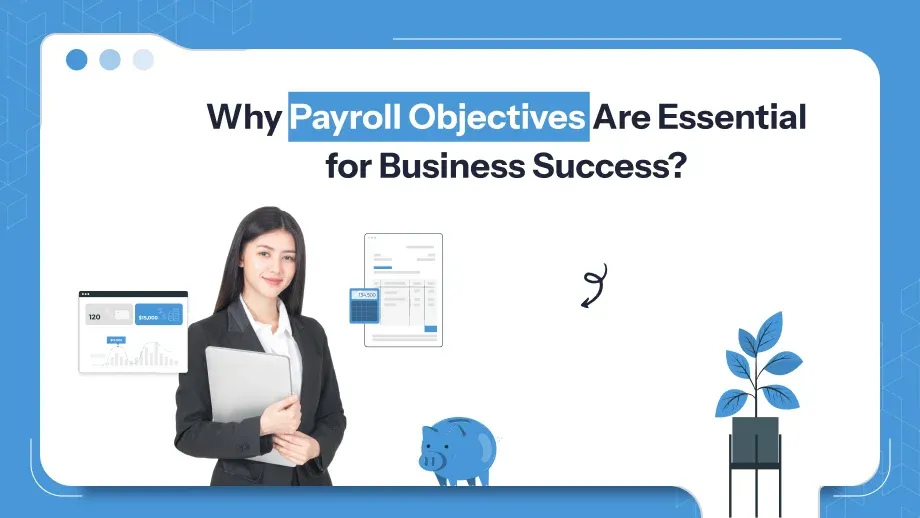
Payroll objectives is the most significant business function ensuring accurate and timely payments to the employees while being compliant with legal and tax authorities. Yet, payroll is much more than check pay issuance; it incorporates several goals, which, if met, may substantially enhance the effectiveness of both the business as well as its staff.
The present blog explains some of the primary payroll goals on which business enterprises should concentrate for streamlined business operation and compliance.In addition to ensuring timely payments and legal compliance, payroll objectives are also essential for aligning financial goals with overall business strategy.
Well-defined objectives of payroll enhance cost management, increase operational efficiency, and create a culture of trust within the organization. The streamlined payroll system also reduces administrative burdens so that HR and finance teams can spend more time on strategic initiatives like talent acquisition and workforce development.
What Are Payroll Objectives?
The aims and outcomes that companies seek to accomplish when handling payroll are referred to as payroll objectives. These goals guarantee that the payroll procedures work properly, that workers receive just compensation, and that the business complies with all relevant rules and regulations. Ensuring liquidity, lowering operational hazards, and fostering a positive work atmosphere all depend on meeting pay goals.
Business Success Key Payroll Objectives
Pay Calculation Accuracy
The most basic payroll objective is the correct payment to employees. Payroll ensures that salaries are calculated according to overtime, bonuses, commissions, and an array of deductions, including taxes, benefits, and contributions to retirement. Payroll errors can lead to employee discontent, job loss of talent, and, more severe, criminal allegations. As such, accurate pay calculation is fundamental to any successful payroll system.
- Objective: Reduce payroll inconsistencies and errors.
- How to achieve it: Invest in dependable payroll software that uses worker information and timekeeping records to determine compensation instantly. Verify payroll accuracy regularly and make sure that all systems reflect the most recent tax rates and benefits deductions.
Timely Payroll Processing
Employees rely on timely payment to budget their personal finances. It leads to discomfort, dissatisfaction, and loss of trust in the employer when paychecks are delayed. So, proper time management of payroll processing will ensure an ideal relationship with your workforce.
- Objective: Ensure payroll is processed and delivered on time, every time.
- How to Achieve It: Set a clear payroll schedule and stick to it. Automate processes where possible and ensure all necessary data (like hours worked and attendance) is submitted well before payday to avoid delays.
Tax Compliance and Reporting
Payroll goals and objectives, taxes are complicated; various tax rates and requirements exist across the federal, state, and local jurisdictions. Payroll taxation accuracy is considered one of the most significant payroll goals. Noncompliance with tax regulations might attract additional penalties, fines, and court proceedings.
- Objective: Be tax-compliant, meeting all requirements set by law.
- How to achieve it: Payroll software will automatically calculate and deduct the taxes. Follow tax law and regulation changes closely and file necessary reports (IRS 941, W-2, state tax forms) on a timely basis.
Employee Benefits Administration
Payroll objectives are not solely about salaries; it is also include the process for handling employees’ benefits, including health insurance, retirement contributions, paid time off, and other perks. Proper management of such employee benefits calls for employee satisfaction as well as compliance with the law. It would be prudent that adequate provisions are always deducted from an employee’s paycheck, and the employer contributes to any plan required.
- Objective: Manage employee benefits and ensure accurate deductions.
- How to Achieve It: Coordinate with your HR department or benefits providers to ensure accurate data entry. Update benefit plans regularly to reflect any changes and confirm that all deductions are made correctly each pay cycle.
Data Security and Confidentiality
Payroll involves very sensitive information. There are such details as salary for the employees, tax information, and bank accounts. These need to be kept secure from identity theft, fraud, and breaches of confidentiality. This ensures that the objective of ensuring data security in the payroll never misses out.
- Objective: Payroll data protection from unauthorized access and breach.
- How to Achieve It: Invest in robust payroll systems with encryption and secure access controls. Only authorized personnel should have access to payroll data, and educate your team on best practices for protecting data.
Simplified Payroll Processes
There is efficiency in the processing of payroll audit objectives, where not only time is saved but also avoids errors. A streamlined process in payroll processing ensures that all the tasks related to data entry, tax calculations, and benefit deductions are performed rapidly and error-free, with less manual intervention.
- Objective: Improving the payroll processing efficiency.
- How to achieve It: To the extent possible, automate payroll tasks, such as timekeeping and tax calculations. Implement integrated systems that automatically update employee information and generate reports. This saves a lot of time and reduces the possibility of human error.
Legal Compliance
There are many laws controlling payroll, including minimum wage laws, overtime laws, and proper classification of an employee. Non-compliance with the said laws can prove quite costly through fines and lawsuits. Compliance with labor laws should be a key goal for any entity running payroll.
- Objective: Comply with Federal, State, and Local Labor Laws.
- How to Achieve It: Stay updated with changes in labor laws, minimum wage rates, and overtime regulations. Review payroll practices regularly for compliance and seek advice from legal or HR experts if in doubt.
Better Reporting and Analytics
Payroll data is not just a pay record for employees but also provides a lot of business insights. Payroll reporting can be used to give good analytics about labor costs, departmental expenses, and employee compensation trends. These analytics help businesses make better financial decisions and improve workforce planning.
- Objective: Utilize payroll data for better decision-making and planning.
- How to Achieve It: Implement payroll software that provides customizable reports and analytics. Use data to identify trends in compensation, monitor labor costs, and make adjustments as needed.
Employee Satisfaction and Retention
Timely, accurate, and transparent payroll objectives bring overall employee satisfaction. When employees are assured of pay and benefits, they are more likely to stay engaged and loyal to the firm. Benefits for employees should always be considered while formulating objectives for payroll.
- Objective: Enhance employee satisfaction through payroll that are transparent and accurate.
- How to achieve It: Provide employees with easy access to payslips and tax forms. Keep employees informed of pay schedules, deductions, and benefits. Ensure employees have a clear path to resolving payroll issues promptly.
Why Payroll Objectives Matter?
One of the most essential tasks for every company is payroll. Payroll is considered one of the simplest pay-dispensing processes. However, the opposite is true as it forms the bedrock for the determination of the overall performance of an organization. Effective payroll management is not only the issuance of checks but a system that creates compliance, increases employee satisfaction, minimizes operational inefficiencies, and sustains the long-term financial health of the business.
Maintaining Legal Compliance and Preventing Penalties
Businesses have to conform to several tax rules and employment standards, which constitute one of the main reasons pay objectives are significant. Payroll-related rules must be obeyed to avoid expensive penalties, fines, or even legal action. These rules encompass everything from withholding the appropriate amount of federal, state, and local taxes to following minimum wage legislation and offering benefits to workers as needed.
Increasing Employee Contentment and Trust
Employee satisfaction is directly correlated with timely and correct remuneration. Workers rely on timely salary payments to fulfill their financial obligations. Employer and employee trust is increased when payroll objectives are met because they ensure an effortless, clear, and error-free compensation process.
Efficiency in Operations
Payroll management often involves processes that are pretty complex, including tracking working hours, overtime, commissions, benefits deductions, and taxes. Without clear payroll objectives, such processes become clumsy and prone to human error, thereby leading to inefficiencies, delays, and added administrative costs.
Reduce Financial Risks
Payroll mistakes lead to heavy losses, overpayment of employees, miscalculations of tax liability, and much more. Meeting the payroll objectives maintains a good financial base of businesses by calculating precisely and avoiding cost-incurring errors that could reflect on the bottom line.
Cutting Down on Financial Risks
The mistake done in the payment of salary leads to financial complications such as the overpayment to the workers and miscalculations of taxes. When achieved, payroll goals assist companies in keeping a solid financial base by guaranteeing precise computations and preventing expensive errors that could have an impact on the bottom line.
Improve reporting and financial planning
Forecast and financial reporting depend on timely and accurate payroll data. Companies can obtain important insights into labor expenses, benefits for staff, and compensation patterns by implementing payroll objectives that emphasize exact keeping records and reporting. These insights can support financial planning for the future, budgeting, and company decision-making.
Increasing Business Continuity and Security
Payroll systems hold sensitive employee information, including social security numbers, bank account details, and salary histories. Payroll objectives should, therefore, ensure data security and confidentiality to continue the business operations. A payroll breach would not only disrupt the business operations but also damage the reputation of the company and erode employee trust.
Conclusion
Achieving payroll objectives enables businesses to conduct operations efficiently with a focus on regulatory compliance as well as meeting the needs of employee satisfaction. Thus, from right payroll calculations for accurate pay scale to managing welfare and tax compliance requirements, these serve as critical indicators of a well-set payroll system, ensuring that set objectives are delivered with a view to creating healthy working environments alongside reduced risks at work.







